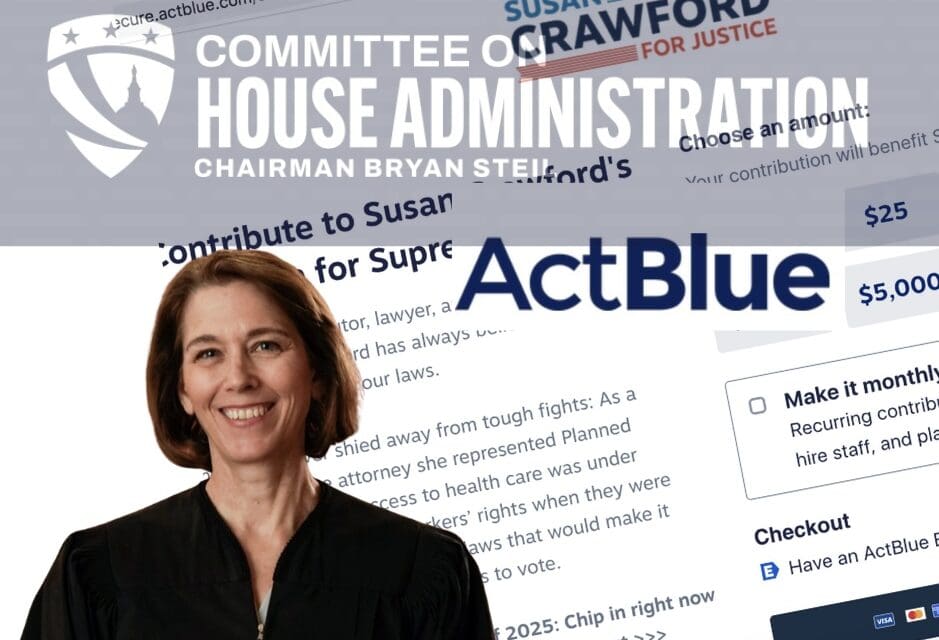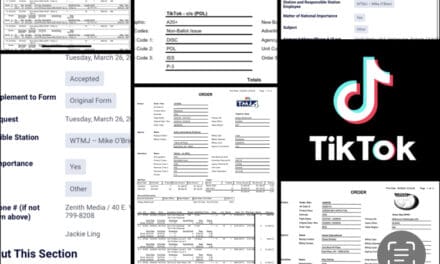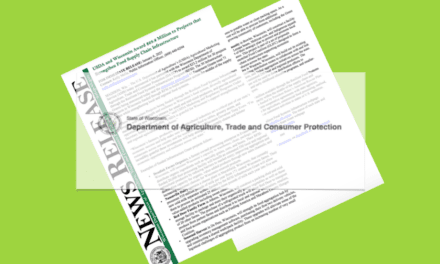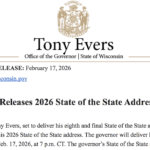1.11.25
Judge Susan Crawford is using a controversial online platform, currently under investigation in Congress and several states, to raise millions of dollars for her campaign for the Wisconsin Supreme Court.
ActBlue, the favored online donation platform for Democratic campaigns, is currently under intense scrutiny from both federal and state officials due to concerns over security practices and potential violations of campaign finance laws.
Recent revelations have exposed significant vulnerabilities in ActBlue’s donation processing system. Notably, until late 2023, ActBlue did not mandate the use of Card Verification Value (CVV) codes for credit card donations, a standard security measure to prevent fraud. This omission potentially enabled unauthorized donations, including those from untraceable sources like prepaid gift cards, raising alarms about the possibility of foreign money influencing U.S. elections.
This apparently does not bother Crawford.
“[O]ver the next three months I’m committed to earning the trust and support of Wisconsinites across the state,” Crawford said this week in a written statement released by her campaign, which boasted about her prolific fundraising.
The U.S. House of Representatives has launched several investigations into ActBlue’s practices. Wisconsin Congressman Bryan Steil , Chairman of the House Administration Committee has been particularly vocal, demanding that ActBlue disclose more about its donor verification policies. In a statement from August 2024, Steil expressed “serious concern” about ActBlue’s lack of security measures to detect or prevent fraud, noting, “We’ve seen foreign countries show interest in working to interfere with the U.S. Democratic process.”
The House Oversight Committee, led by Chairman James Comer, has also been involved, revealing that the U.S. Treasury Department’s money laundering detection system had flagged hundreds of suspicious activities reports related to ActBlue. These findings prompted a broader investigation into the platform’s practices, with a specific focus on potential foreign contributions from countries like China, Russia, Iran, and Venezuela.
Crawford’s campaign finance report must be field by Wednesday but in a statement released this week her campaign noted they’ve brought in funds from more than 6,000 individual donors. The campaign bragged that Crawford is entering 2025 with more than $2.1 million cash-on-hand, a record for a Wisconsin Supreme Court candidate.
Several state investigations have paralleled the federal inquiries into ActBlue. Texas Attorney General Ken Paxton initiated an inquiry in December 2023, which led to ActBlue finally requiring CVV codes for donations. Paxton has since made a criminal referral to the Department of Justice (DOJ), alleging that “bad actors are likely using ActBlue’s platform to make illegal campaign contributions.”
In Virginia, Attorney General Jason Miyares is investigating reports of “dummy” accounts making thousands of small donations, suggesting potential fraud. Similar probes are underway in Wyoming, Missouri, and other states, focusing on contributions made without the knowledge or consent of the listed donor.
Congress is not standing idle. Chairman Steil introduced the Secure Handling of Internet Electronic Donations (SHIELD) Act in September 2024, which aims to prohibit political committees from accepting online contributions unless the CVV and billing address are provided, and bans donations via prepaid cards. This bill passed through the Committee on House Administration and underscores the legislative push to tighten donation security. ActBlue says it supports the legislation.
ActBlue has responded to these allegations by asserting its commitment to donor security and denying any wrongdoing. In a statement, they emphasized, “We rigorously protect our donors’ security and enforce strict anti-fraud compliance policies.” However, these assurances have not quelled the growing concerns or halted the investigations.
In December, Steil’s committee announced the findings of his subpoena of ActBlue. Documents turned over to the committee revealed that as of September 2024, ActBlue finally implemented updated policies to “automatically reject donations that use foreign prepaid/gift cards, domestic gift cards, are from high-risk/sanctioned countries, and have the highest level of risk as determined,” by its solution provider, Sift.
“The documents provided to the Committee also confirm that ActBlue still accepted these concerning payment methods in July, a period when Democrats raised a record number of campaign money before implementing these safeguards,” said Steil.
As ActBlue faces these multifaceted investigations, it has not dissuaded Judge Crawford from relying on the platform to fuel her campaign coffers.
For its part, ActBlue denies any wrongdoing. On it’s site it says “ActBlue serves as a non-profit intermediary that enables individuals to make secure and legal contributions to political candidates, political action committees, and other political and nonpartisan, nonprofit organizations. In full compliance with federal, state, and local campaign finance laws, ActBlue regularly files public reports of all contributions made on its platform.”
The outcome of the ActBlue probes could lead to stricter regulations on online political donations, but these will not become law before this Spring’s Wisconsin Supreme Court election.
Crawford faces Waukesha County Judge, former Wisconsin Attorney General Brad Schimel in the April contest.
1.11.25














